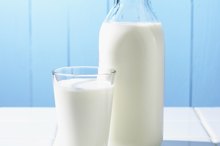What does fact checked mean?
At Healthfully, we strive to deliver objective content that is accurate and up-to-date. Our team periodically reviews articles in order to ensure content quality. The sources cited below consist of evidence from peer-reviewed journals, prominent medical organizations, academic associations, and government data.
- Current Issues in Intestinal Microbiology: Lactic Acid Bacteria as Probiotics
- Current Issues in Intestinal Microbiology: Lactic Acid Bacteria as Probiotics
- MedlinePlus: Lactose Intolerance
The information contained on this site is for informational purposes only, and should not be used as a substitute for the advice of a professional health care provider. Please check with the appropriate physician regarding health questions and concerns. Although we strive to deliver accurate and up-to-date information, no guarantee to that effect is made.
Will Buttermilk Help With Digestion?
Buttermilk is a fermented milk that, similarly to yogurt, is made by adding cultured bacteria. The fermentation gives buttermilk a distinct, tangy flavor that's welcome in baked goods and pancakes. This bacteria may also offer health benefits and help with digestion.
If you are experiencing serious medical symptoms, seek emergency treatment immediately.
Source of Probiotics
The lactic acid bacteria used to make buttermilk are considered probiotics, which are friendly bacteria that promote gut health and play a role in digestion 2. These bacteria help you digest food and absorb nutrients. They also help keep the bad bacteria population down and may decrease your risk of cancer, according to Berkeley Wellness 3.
Buttermilk and Lactose Intolerance
Calories & Sugar in Skim Milk
Learn More
People with lactose intolerance cannot drink milk because their bodies do not produce enough of the enzyme required to digest lactose, which is the sugar in milk, and drinking milk may cause diarrhea or abdominal pain 4. People with lactose intolerance may be able to tolerate buttermilk, however, because the lactic acid bacteria break down some of the lactose, decreasing the amount in the milk 4.
Other Benefits of Buttermilk
Like regular milk and yogurt, buttermilk is a good source of protein, calcium and potassium. To limit fat and calorie intake, use low-fat buttermilk instead of whole versions. A 1-cup serving of low-fat buttermilk has 100 calories, 2 grams of fat, 12 grams of carbs and 8 grams of protein. It also meets 28 percent of the daily value for calcium, 22 percent of the daily value for riboflavin and phosphorus, and 11 percent of the daily value for potassium.
- Like regular milk and yogurt, buttermilk is a good source of protein, calcium and potassium.
- To limit fat and calorie intake, use low-fat buttermilk instead of whole versions.
Healthy Uses for Buttermilk
What Are the Benefits of Buttermilk Fasting?
Learn More
If you enjoy the tangy taste of buttermilk, you can drink it straight -- like a glass of regular milk -- or use it in your bowl of cereal. It also makes a good liquid base for a fruit smoothie. In baked goods, buttermilk helps to create a more tender, moist treat by increasing the rising action of the baking soda.
While some people with lactose intolerance may be able to drink buttermilk without experiencing any stomach upset, it's still a source of lactose and may not be suitable for everyone 4. You can make lactose-free buttermilk by adding lemon juice or vinegar to lactose-free milk or a milk alternative such as soy milk.
- If you enjoy the tangy taste of buttermilk, you can drink it straight -- like a glass of regular milk -- or use it in your bowl of cereal.
Related Articles
References
- Cook's Illustrated: 5 Buttermilk Questions You Were Too Embarassed to Ask
- Current Issues in Intestinal Microbiology: Lactic Acid Bacteria as Probiotics
- Berkeley Wellness: Probiotics: Pros and Cons
- MedlinePlus: Lactose Intolerance
- US National Library of Medicine. Lactose intolerance. Medline Plus. 2019.
- National Institutes of Health. Lactose Intolerance. Genetics Home Reference. 2019.
- Borghini R, Donato G, Alvaro D, Picarelli A. New insights in IBS-like disorders: Pandora's box has been opened; a review. Gastroenterol Hepatol Bed Bench. 2017;10(2):79-89.
- Szilagyi A, Ishayek N. Lactose intolerance, dairy avoidance, and treatment options. Nutrients. 2018;10(12). doi:10.3390/nu10121994
- Johns Hopkins Medicine. Lactose intolerance.
- KidsHealth from Nemours. Lactose intolerance. 2015.
- UW Integrative Health. The elimination diet. School of Medicine and Public Health University of Wisconsin Madison.
- Dekker PJT, Koenders D, Bruins MJ. Lactose-free dairy products: Market developments, production, nutrition and health benefits. Nutrients. 2019;11(3). doi:10.3390/nu11030551
- Cleveland Clinic. Gas: management and treatment. 2016.
- Ferreira-lazarte A, Moreno FJ, Villamiel M. Application of a commercial digestive supplement formulated with enzymes and probiotics in lactase non-persistence management. Food Funct. 2018;9(9):4642-4650. doi:10.1039/c8fo01091a
- Ferreira-Lazarte A , Moreno FJ , Villamiel M .Application of a commercial digestive supplement formulated with enzymes and probiotics in lactase non-persistence management.Food Funct. 2018 Sep 19;9(9):4642-4650. doi: 10.1039/c8fo01091a.
- Varjú P, Gede N, Szakács Z, Hegyi P, Cazacu IM, Pécsi D et al. Lactose intolerance but not lactose maldigestion is more frequent in patients with irritable bowel syndrome than in healthy controls: A meta-analysis.Neurogastroenterol Motil. 2019 May;31(5):e13527. doi: 10.1111/nmo.13527. Epub 2018 Dec 17.
Writer Bio
Jill Corleone is a registered dietitian and health coach who has been writing and lecturing on diet and health for more than 15 years. Her work has been featured on the Huffington Post, Diabetes Self-Management and in the book "Noninvasive Mechanical Ventilation," edited by John R. Bach, M.D. Corleone holds a Bachelor of Science in nutrition.









